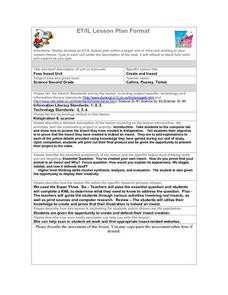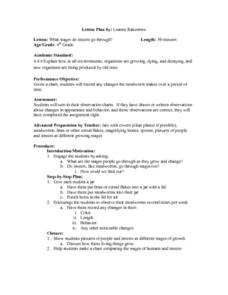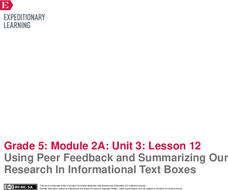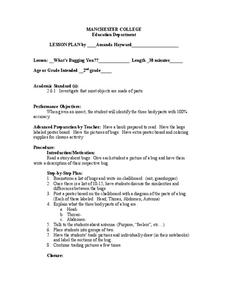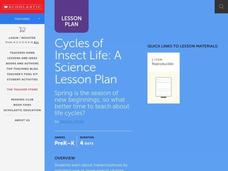Curated OER
Insect Book
Fifth graders select an insect and create a page for an Insect ABC book to display their research. They choose an insect from a given letter of the alphabet and use KidPix to illustrate. They write 2-3 sentences describing their insect...
Curated OER
Insect Unit
Second graders use technology to investigate the concept of an insect. They use Kidspiration in order to create an insect. Then research is conducted to match the picture with the correct insect. Then students write a report about the...
Curated OER
Insects: Listen and Learn
Fourth graders use their listening skills to make observations of their environment. They study various insects within a natural setting. They, along with their identification of the insect, create a sketch of the insect.
Curated OER
What Stages Do Insects Go Through?
Fourth graders observe mealworms over a period of time and record any changes they observe. They record any changes in color, length, behavior, and any other noticeable changes, identify the stages of the mealworms, and create a chart...
Curated OER
Insect Classification
Students compare and contrast the visible structures of three insects based on photographs. They differentiate characteristics of crane flies, ants, and wasps then create a simple classification system.
Curated OER
Aquatic Insects: Water Quality Index & Diversity Index
Students search stream beds to study the life cycle and adaptations of stream insects. They explore creeks and streams to see the diversity index of creeks or streams and to find the water qualit index.
Curated OER
Insect Condominiums
Fourth graders design an insect home using recyclable materials making sure that the organism's needs are met. They study the concepts of niche, habitat and survival requirements.
Curated OER
Insect Biodiversity
Students observe the process of transect sampling using insect nets, to get a chance to compare the presence of different species and populations in various vegetational areas. They study the different specimens caught and compare their...
EngageNY
Using Peer Feedback and Summarizing Our Research In Informational Text Boxes
Insert text box here. Learners use index cards to create their own informational text boxes. The text box includes information about an insect in the rainforest. Scholars also complete the draft of their research science journal entries.
Curated OER
Web of Life
Students construct a web of life. For this ecosystem lesson students are introduced to ecosystems and life cycles. Insects are the main focus.
Curated OER
Activity Plan 5-6: Bugs, Bugs, Bugs!
Students become entomologists for a day. For this life science lesson, students go on an insect hunt and investigate insects and their homes. This leads to the creation of an insect by each student. Lesson includes a take-home...
Curated OER
Take an Ant to Lunch
Second graders construct a model of an ant, exemplifying that ants are insects. Students gather data create a pictograph chart to show ant food preferences. Also, 2nd graders access the Internet to explore ant eating habits.
Curated OER
The Spider Beside Her
Second graders are introduced to the characteristics of spiders. In groups, they compare and contrast spiders to different insects to discover spiders are not an insect at all. In groups, they create a model of a spider and discuss its...
Curated OER
So You Think You're Tough
Fourth graders learn how to classify animals. In this invertebrates lesson, 4th graders discuss how we classify thinks into groups and move into a discussion about classifying animals. Students learn about the differences between...
Curated OER
Habitat Breakdown
Students investigate the fragility of insects and organisms and their survival needs. In this habitat instructional activity, students discuss what elements they need to survive day to day, then hypothesize what they would need to live...
Curated OER
Bugs
Students participate in an after school program that promotes communications skills, hypothesizing, exploring, recording of data, leadership roles and making comparisons. They explore the world of insects, where they come from, how they...
Curated OER
What's Bugging You?
Second graders investigate insects. In this parts of a whole, 2nd graders discuss what the three body parts of an insect are as well as the antenna. Students create their own insect labeling each body part and antenna.
Curated OER
Measuring Animal Sizes (and Relative Sizes in our Animal Environment)
Students discover the actual size and weight of many insects and animals. For this biology lesson, students investigate animals and insects to determine their actual weight and size. In groups, students create an animal or insect of...
Curated OER
Animal Diaries
Students read Diary of a Worm by Foreen Cronin. In this journal writing instructional activity, students research an animal and write a diary by their animal. Students apply the research they've completed in their writings. Students...
Curated OER
Reading Skills Practice-Grade Three
In this reading skills worksheet, 3rd graders read several passages on a variety of topics and answer multiple choice questions after each. An answer key is included.
Curated OER
Symbols of Our State: Arkansas
Here are a series of lessons designed to assist early elementary learners to discover the symbols of Arkansas. They learn about the state flag, insect, state seal, state bird, flower, tree, and gem. A booklet (emedded in the plan), is...
Curated OER
Wetland Transects
Students lay out transect lines beside a local stream or river. There they record species of plants and insects living around the stream. By doing so, students explore how to use transect sampling techniques, use a variety of methods to...
Curated OER
Cycles of Life
Students begin their study of insect life cycles by listening to a read aloud of Eric Carle's The Very Hungry Caterpillar. They learn the vocabulary of metamorphosis including egg, larva, pupa, chrysalis, and adult. They observe actual...
Curated OER
The right place to live
How do various plants survive in different environments? They adapt! Kids determine which plant traits make them perfect for their specific environment. They consider three plants and can even complete a plant experiment. Note: Intended...



